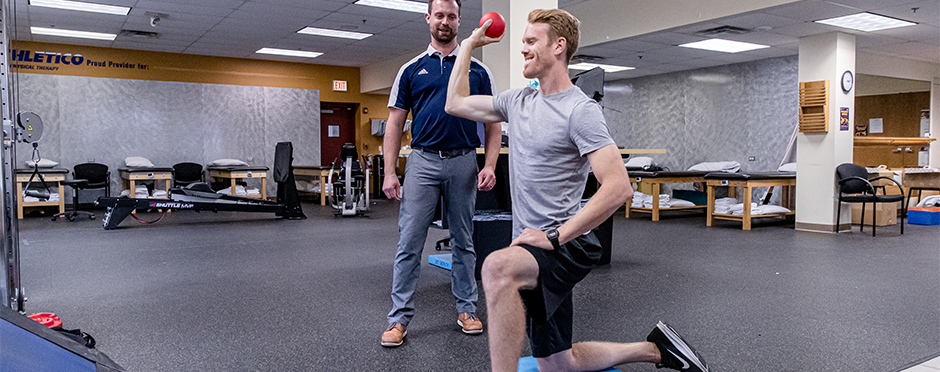
Return to Sport vs. Return to Work
Leave a CommentThe American Physical Therapy Association describes Physical Therapists as “movement experts who improve quality of life through prescribed exercise, hands-on care, and patient education.” As physical therapists, with our patient’s help, we shape their goals around what improves their specific quality of life. Often, we picture athletes returning to sports or patients relearning how to walk. Less commonly, we think about the importance of injured workers returning to their jobs without limitations. It’s easy to understand why the rehabilitation process for return to sport is so intense and personalized for a patient. The rehabilitation process for return to work should be just as intense and personalized to assist the employee in reaching their goals.
For both the industrial athlete and the typical athlete, it’s important to help return the patient to high-level activities. Work specific duties can include heavy lifting, high repetition, long hours, and enduring a long duration of standing or walking. Sport-specific duties can increase the patient’s physical conditioning or endurance, improve force production, and increase strength to return to a specific sport or position. With the return to work or sport, we see many overlapping goals. As physical therapists, we aim to improve the endurance, strength, and mobility of these populations, as well as improve movement mechanics to decrease risk for re-injury. Patients returning to sports or work require specialized care to assist them in meeting their high-level goals.
Whether the patient is an athlete or an injured employee, it takes a team to help with the rehabilitation process. Physical therapists may communicate with the doctor involved with an athlete, and the athletic trainer, coach, or parents of the player. The same goes for the injured worker. Physical therapists keep open communication with the case manager, doctor, adjuster, and employer. For both the athlete and industrial athlete, to provide the best care, it’s crucial to work as a team with a common goal in mind; to help the patient return to work or help the patient return to sport.
With high-level goals and an entire team being a part of the rehabilitation process, it’s important to have baseline assessments that can provide everyone with information on how the patient is doing. With patients returning to work and sport, there are often standardized testing or protocols to help assess progress and identify when patients are ready to progress to their job or sport. We have tests such as the triple hop test, the Y balance assessment, and the hamstring to quadriceps ratio for sports. For work, we utilize functional status reports or functional capacity evaluations to objectify the patient’s readiness for returning to normal job duties. Objective measurements help us make unbiased decisions on whether the patient is achieving their goals.
Your Rehabilitation Team
Whether you’re an injured athlete or injured worker, physical therapists can, and should, be a part of your rehabilitation team. They’re trained to examine each patient in-depth, develop a plan of care, and assist in helping the patient reach their individualized goals. To improve your quality of life, reach out to your local Athletico and request a free assessment. Free assessments are available both in-clinic and virtually through our telehealth platform.
*Per federal guidelines, beneficiaries of plans such as Medicare, Medicaid, Tricare, VHA and other federally funded plans are not eligible for free assessments.
The Athletico blog is an educational resource written by Athletico employees. Athletico bloggers are licensed professionals who abide by the code of ethics outlined by their respective professional associations. The content published in blog posts represents the opinion of the individual author based on their expertise and experience. The content provided in this blog is for informational purposes only, does not constitute medical advice and should not be relied on for making personal health decisions.
